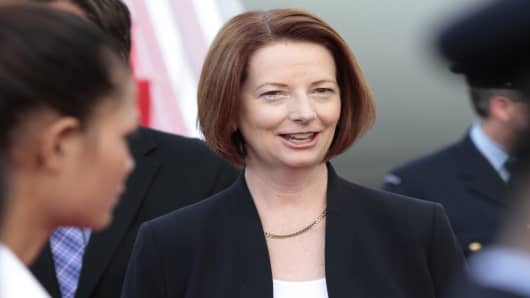One thing is already clear about Australia's unprecedented eight-month election campaign: it won't be a popularity contest.
Prime Minister Julia Gillard, regularly described on talkback radio and in conservative media as untrustworthy and desperately clinging to power, is set to be trounced in the September election if opinion polls are to be believed.
Yet her rival, Conservative opposition leader Tony Abbott, is even more unpopular on a personal level with voters, even if they rate his opposition coalition about 12 points higher than Gillard's Labor-led minority government.
(Read More: Australian PM Surprises With September Election Call)
The prospect that Abbott will take over the reins of the world's 12th largest economy this year is worse than "being told there's no beer left", according to one response on a Twitter campaign.
The election is unique not only for the length of the campaign - Gillard has said she will go to the polls in September - but also because the two main contenders are the most unpopular politicians in the country.
"It is going to be a grudging vote. People certainly won't be voting for personalities or the qualities of the leaders," Griffith University political analyst Paul Williams said.
The latest Nielsen poll shows Abbott, a super-fit former Rhodes scholar, has a 60 percent disapproval rating. Gillard is also widely disliked, with 48 percent disapproving of the Welsh-born lawyer.
Aggressive Style
Abbott, 55, has turned off voters with his aggressive style and relentless opposition to government policies, designed to force a crisis and an early election.
Social media has been harsh on both Abbott and Gillard with a recent Twitter trend tagged #ThingsMorePopularThanTonyAbbott attracting more than 5,200 responses, with answers such as "a hockey ball to your private parts".
Gillard, 51, fared little better in a similar campaign, with "gravel rash" nominated as more popular than the prime minister.
Worried by his negative image, Abbott has promised to be more positive in the election year.
(Read More: Australia Inflation Surprisingly Tame in Q4)
"I think what people are now looking for is for a little bit more from us," Abbott told his lawmakers on Monday. "They want us not so much to be an opposition but to be an alternative government."
Abbott wants the next election to be a vote on a carbon tax, which he has promised to scrap and which he blames for pushing up electricity prices. He is also promising to end a new 30 percent tax on coal and iron ore mine profits.
However, policy has been largely sidelined in an increasingly bitter and personal political debate.
In a withering attack in parliament last year, Gillard decried Abbott as a misogynist, reflecting polls which find Abbott is more unpopular with women voters.
Abbott says Gillard is unfit to govern after her backflip on the carbon tax, which she once promised not to introduce, highlighting the prime minister's struggle to gain public trust.
Polls also show Gillard is more unpopular with male voters.
Popular Alternatives
To be sure, Australia has had unpopular leaders before. Former Labor prime minister Paul Keating, nicknamed the Lizard of Oz by British media for putting his arm around the queen during a royal visit, had a lowly 27 percent approval as preferred prime minister in late 1993. He lost an election in early 1996.
Conservative opposition leader Alexander Downer had a 20 percent approval in late 2004, shortly before he was replaced.
Complicating the problem for the main parties is the fact both leaders are being stalked by alternatives within their own ranks who are much more popular with voters.
The government has former prime minister Kevin Rudd, overthrown by Gillard in a backroom coup in 2010, while former Liberal Party leader Malcolm Turnbull is in the wings should Abbott fall.
The two say they have no plans to challenge and lack support within their respective parties. Yet both continue to have a high profile in the media and strong social media presences.
(Read More: Australia Abandons Budget Plan as Tax Take Tumbles)
Rudd, a bookish former diplomat who speaks Mandarin, has resumed weekly national morning television appearances which he had used to build support ahead of his 2007 election win.
Rudd also has an impressive 1.2 million followers on Twitter, and a further 700,000 on China's Twitter alternative Weibo, compared with Gillard's 340,000 Twitter followers.
Turnbull, a wealthy former Internet entrepreneur and head of Australia's republican movement, is a media favorite and regular on political chat shows.
He has 145,000 Twitter followers, compared with Abbott's 98,000.
Australia has compulsory voting, so the low approval ratings won't affect voter turnout on election day on September 14.
But pollster John Scales from JWS Research said focus groups made it clear the election would be a vastly different contest with the alternative leaders.
"People light up when they think they could have Rudd or Turnbull. It gives the discussion more light and sparkle. But it is just not going to happen," he told Reuters, adding neither had the party numbers to roll their leaders.
Voter dislike of the leaders might make voters more cynical, but could also help focus the election on policy rather than personality, he said.
"There is nothing enviable about the choice, but voters have to make it. So it becomes about other things," he said. "It becomes the choice of the lesser evil."


